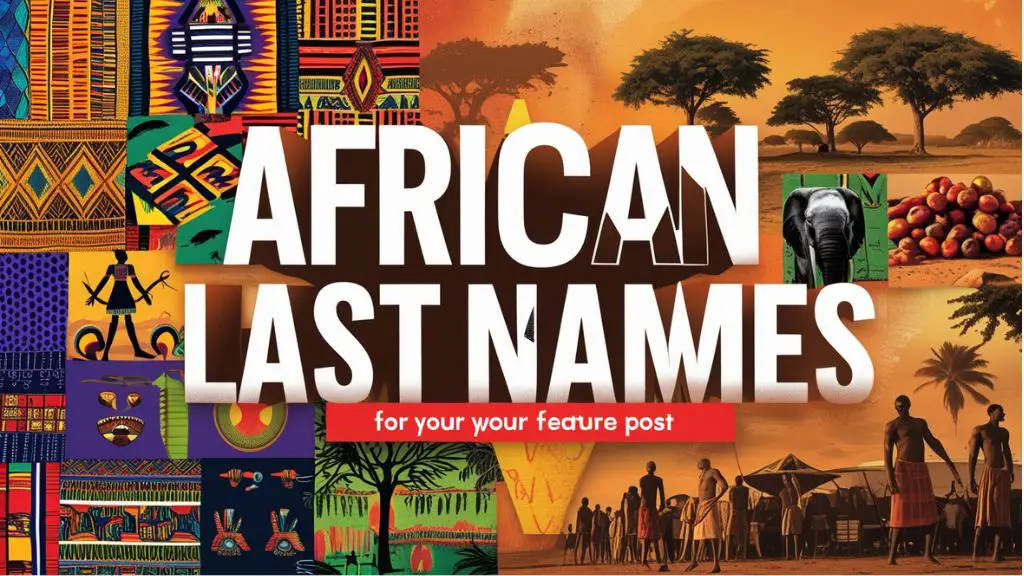African last names carry a rich tapestry of history, culture, and tradition. They are more than mere identifiers; they are symbols of identity, heritage, and belonging. These beautiful African last names often tell stories of ancestry, values, and the unique characteristics of the people who bear them. In this article, we will explore the significance and beauty of these names, their origins, and their cultural importance.
Names have always played a significant role in shaping individual and communal identities. In Africa, last names are particularly meaningful as they often reflect the tribe, region, or even the circumstances surrounding a person's birth. The beauty of African last names lies not only in their sounds but also in the deep cultural meanings they convey.
As we delve into the world of African surnames, you'll discover how these names connect people to their roots and preserve their cultural heritage. This article aims to provide an in-depth exploration of beautiful African last names, their significance, and how they continue to influence modern-day naming conventions across the continent and beyond.
Read also:The Hilton Branson Landing
Table of Contents
- The History and Origins of Beautiful African Last Names
- Cultural Significance of African Last Names
- Tribal Heritage and Regional Influence
- Popular Beautiful African Last Names
- The Phonetics and Melody of African Last Names
- Modern Influence of African Last Names
- Subheading: Understanding the Phonetics
- Subheading: Historical Context
- Subheading: Modern Adoption
- Conclusion: Celebrating the Beauty of African Last Names
The History and Origins of Beautiful African Last Names
African last names have a long and storied history that dates back centuries. These names often originated from tribal traditions, regional customs, and sometimes even religious practices. In many African cultures, surnames were not traditionally used in the same way as in Western societies. Instead, individuals were identified by their given names and their father's or grandfather's names.
Over time, as societies evolved and interactions with other cultures increased, the concept of surnames became more formalized. Many African last names reflect the tribe or ethnic group to which a person belongs, such as Zulu, Yoruba, or Igbo. These names often carry deep cultural significance and are passed down through generations, preserving the family's heritage and identity.
Historical Context
The history of African last names is closely tied to the continent's diverse cultural landscape. For example, in West Africa, names like Diop and Sow are common among the Wolof people of Senegal, while in East Africa, names like Odinga and Kenyatta are associated with the Luo and Kikuyu tribes of Kenya. Each region has its own unique naming conventions, reflecting the distinct cultural and linguistic traditions of the people.
Cultural Significance of African Last Names
Beautiful African last names are not just identifiers; they are cultural symbols that carry deep meaning. These names often reflect the values, beliefs, and traditions of the communities they come from. For instance, some names signify strength, wisdom, or bravery, while others may represent specific events or circumstances surrounding a person's birth.
In many African cultures, names are given with great thought and consideration. Elders or spiritual leaders often play a role in naming ceremonies, ensuring that the chosen name aligns with the family's heritage and the child's destiny. This practice underscores the importance of names in shaping identity and connecting individuals to their cultural roots.
Modern Adoption
Today, beautiful African last names continue to influence naming conventions worldwide. Many people of African descent in the diaspora have embraced their ancestral names as a way to reconnect with their roots. Additionally, individuals from other cultures have shown interest in adopting African names for their uniqueness and cultural significance.
Read also:When Was Slavery Over
Tribal Heritage and Regional Influence
African last names are heavily influenced by tribal and regional traditions. Each tribe has its own set of naming conventions, often reflecting the language, history, and culture of the people. For example, in Southern Africa, the Zulu people use names like Dlamini and Khumalo, while the Xhosa people have names like Mandela and Mbeki.
Regional influences also play a significant role in shaping African surnames. Names from North Africa, such as those of the Berber and Arab communities, differ markedly from those of Sub-Saharan Africa. This diversity highlights the rich tapestry of cultures and traditions that make up the African continent.
Popular Beautiful African Last Names
Here is a list of some of the most beautiful and popular African last names, along with their meanings:
- Adamsu: A name of Ethiopian origin, meaning "son of Adam."
- Dlamini: A Zulu name meaning "of the people."
- Obeng: An Akan name from Ghana, meaning "elder brother."
- Sow: A Wolof name from Senegal, often associated with leadership.
- Toure: A name of Malian origin, commonly found among the Mandinka people.
- Okonjo: An Igbo name from Nigeria, meaning "born on the day of the market."
These names, among many others, showcase the diversity and beauty of African naming traditions.
Understanding the Phonetics
The phonetics of African last names are often characterized by unique sounds and rhythms that reflect the languages from which they originate. Many African languages use tonal patterns, where the pitch of a word can change its meaning. This aspect adds to the musical quality of African names, making them distinct and memorable.
The Phonetics and Melody of African Last Names
African last names are known for their melodic quality and rhythmic patterns. The sounds of these names often evoke a sense of harmony and balance, reflecting the cultural values of the communities they come from. For example, the Swahili name "Mwangi" has a soft, flowing sound, while the Hausa name "Abubakar" is more robust and resonant.
Understanding the phonetics of African names can enhance appreciation for their beauty and complexity. Linguists and cultural scholars often study these names to gain insights into the languages and traditions of African societies.
Modern Influence of African Last Names
In recent years, beautiful African last names have gained popularity worldwide. Celebrities, politicians, and cultural icons have helped bring attention to these names, showcasing their elegance and cultural significance. For instance, the late South African leader Nelson Mandela, whose last name means "troublemaker," became a global symbol of resilience and justice.
Furthermore, the rise of pan-Africanism and cultural pride has encouraged many people to embrace their African heritage through their names. This trend has led to a renewed interest in African naming traditions and their preservation for future generations.
Modern Adoption
As globalization continues to bring people from different cultures together, the adoption of African last names has become more common. Many parents choose these names for their uniqueness and cultural significance, ensuring that their children carry a piece of Africa with them wherever they go.
Conclusion: Celebrating the Beauty of African Last Names
In conclusion, beautiful African last names are a testament to the rich cultural heritage and diversity of the African continent. They carry deep meanings, reflect tribal traditions, and connect individuals to their roots. Through this article, we have explored the history, significance, and modern influence of these names, highlighting their beauty and importance.
We invite you to share your thoughts and experiences with African last names in the comments below. If you enjoyed this article, please consider sharing it with others who may appreciate the cultural richness of African naming traditions. Additionally, explore our other articles to learn more about the fascinating world of African culture and heritage.


